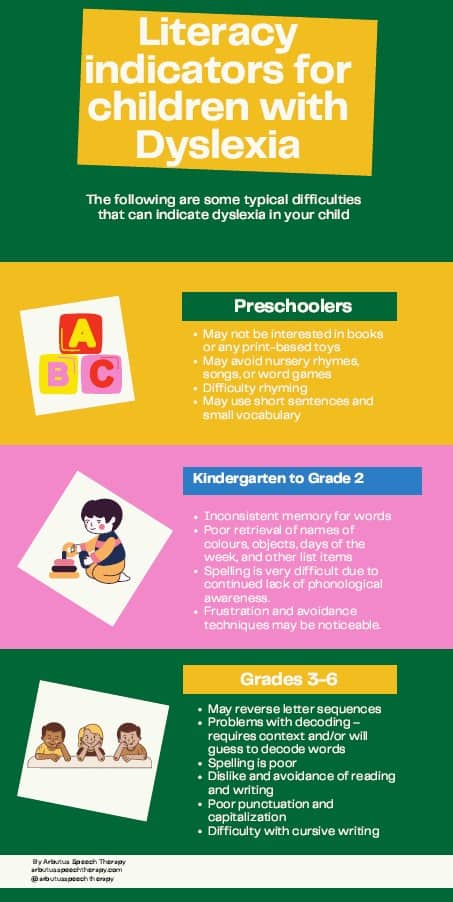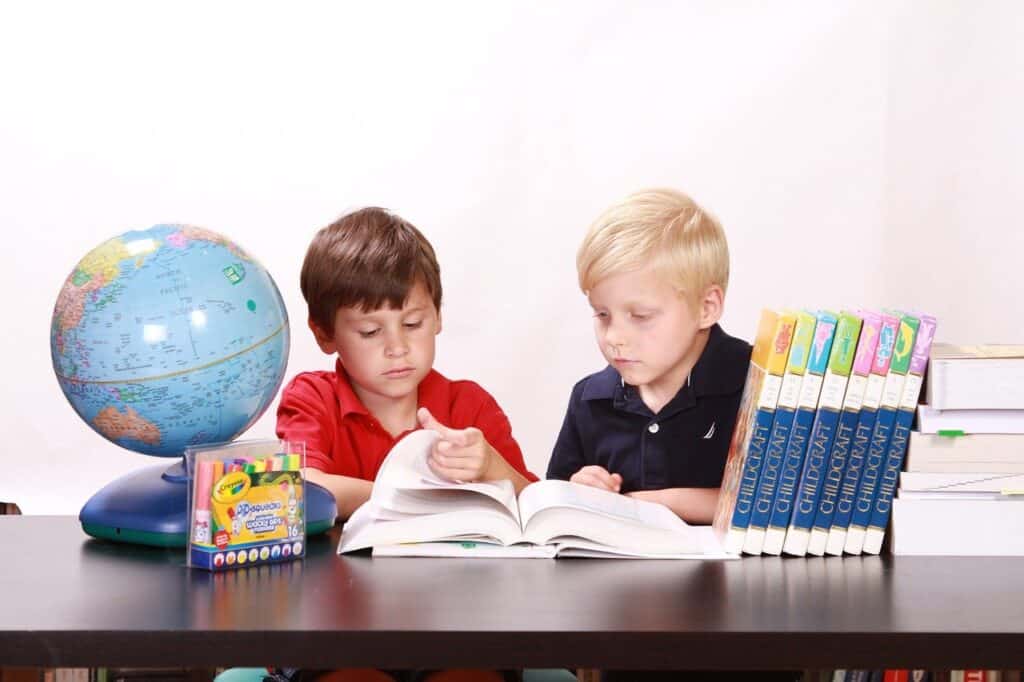Are you worried that your child has problems with reading, writing, and spelling? If so, you might find this information about language-based learning difficulties (LLDs) useful. The most widely-known LLD is Dyslexia, which is when one has difficulty with reading. Unlike other learning disabilities, LLDs are not caused by problems with vision, hearing, or an intellectual disability. In fact, children with LLD’s are often of average or above average intelligence.
Dyslexia is a language-based learning disability that affects 5-10% of people. It affects an individual’s ability to accurately and fluently recognize words. It is characterized by poor spelling and difficulty reading, and it often runs in families. Dyslexia exists on a spectrum ranging from difficulties that can be slightly annoying to severely limiting.
Literacy indicators for children with Dyslexia
At each age, there are literacy indicators observable in your children. A diagnosis for dyslexia is given by a psychologist, however a speech therapist can provide a referral for suspected dyslexia or other learning disorder. If there is any concern about any of these difficulties, it generally doesn’t hurt to get a professional opinion as to whether the difficulties are within normal limits.

Preschoolers
- May not be interested in books or any print-based toys
- May avoid nursery rhymes, songs, or word games
- Difficulty rhyming
- May use short sentences and small vocabulary
Kindergarten to Grade 2
- Inconsistent memory for words
- Poor retrieval of names of colours, objects, days of the week, and other list items
- Spelling is very difficult due to continued lack of phonological awareness.
- Frustration and avoidance techniques may be noticeable.
Grades 3-6
- May reverse letter sequences
- Problems with decoding – requires context and/or will guess to decode words
- Spelling is poor
- Dislike and avoidance of reading and writing
- Poor punctuation and capitalization
- Difficulty with cursive writing
Since LLDs affect a child’s ability to learn language-based skills, they are often not detected until a child enters the intermediate grades (around age 8.) This is around the time when students make the shift from ‘learning to read‘ to ‘reading to learn‘. You or your child’s teacher may notice that your child is struggling to keep up with their peers at this time. Common difficulties include difficulties with decoding (sounding out words when reading or spelling), listening comprehension, and expressing thoughts using spoken word.
The following breakdown from the American Speech and Hearing Association provides information on literacy milestones that you would expect for a student in Grade 3:
Reading
- Understand phonics, or how sounds and words go together.
- Use word analysis skills. This means knowing root words, prefixes, and suffixes.
- Use clues from a story to help understand what she reads.
- Predict and explain what will happen next in stories. Compare stories and tell how stories are different.
- Ask and answer questions about what he reads.
- Use what she knows to learn about new topics.
- Read grade-level books with few mistakes.
- Reread and correct errors.
Writing
- Plan, organize, revise, and edit.
- Write stories, letters, and short reports.
- Use details in writing.
- Spell simple words correctly.
- Correct most spelling without help.
- Use a dictionary to correct spelling.
How can a Speech Therapist help when your child is struggling with language?
Speech-language pathologists are trained to identify language-based learning difficulties and will use oral and written language assessments to identify your child’s specific areas of need. At Arbutus Speech Therapy, our speech-language pathologists will work with you and your child to provide resources, education, and helpful strategies to help your child to be a more successful reader, writer, and speller! Contact Arbutus Speech Therapy today or Book Online for a free phone consultation with a registered Speech-Language Pathologist.

More Resources on Literacy
- Early Literacy Promotion: The A-B-Cs for busy clinicians: A one-hour, self-directed CME developed by the Canadian Paediatric Society and the Canadian Children’s Literacy Foundation
- Early literacy resources: Canadian Paediatric Society
- Canadian Children’s Literacy Foundation
- Language Acquisition in Immigrant and Refugee Children: First language use and bilingualism: Caring for Kids New to Canada, Canadian Paediatric Society

